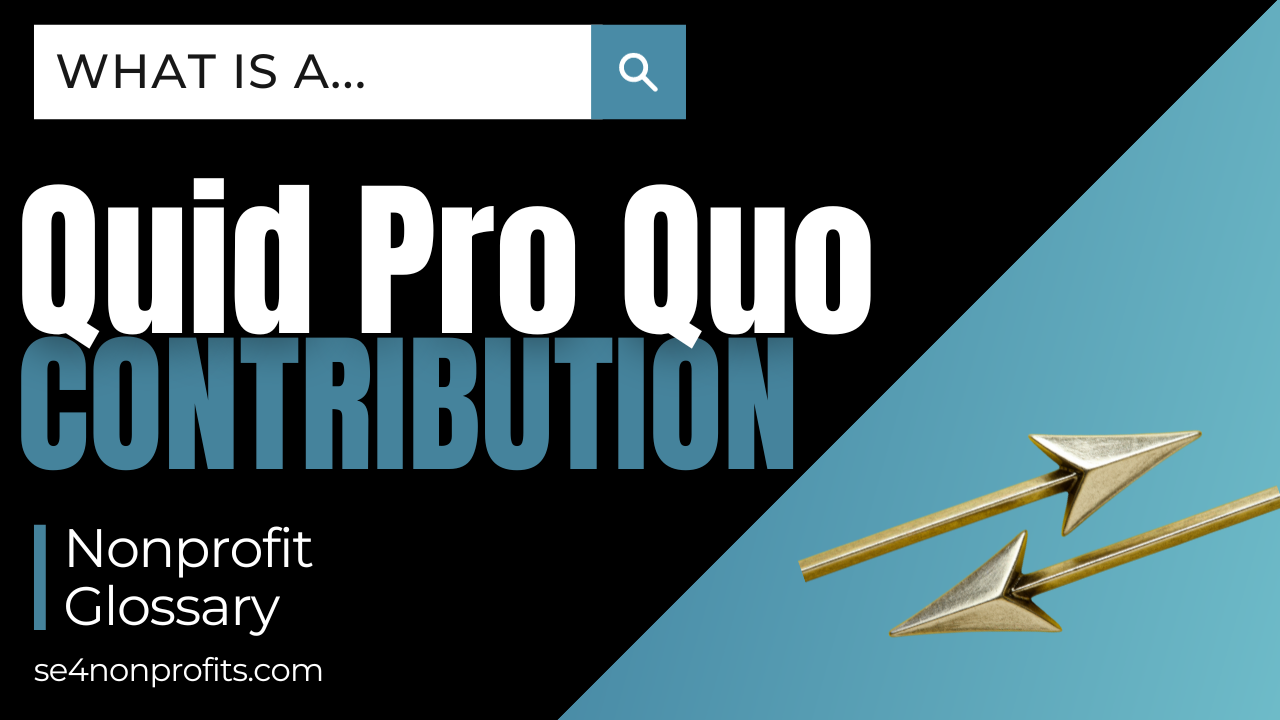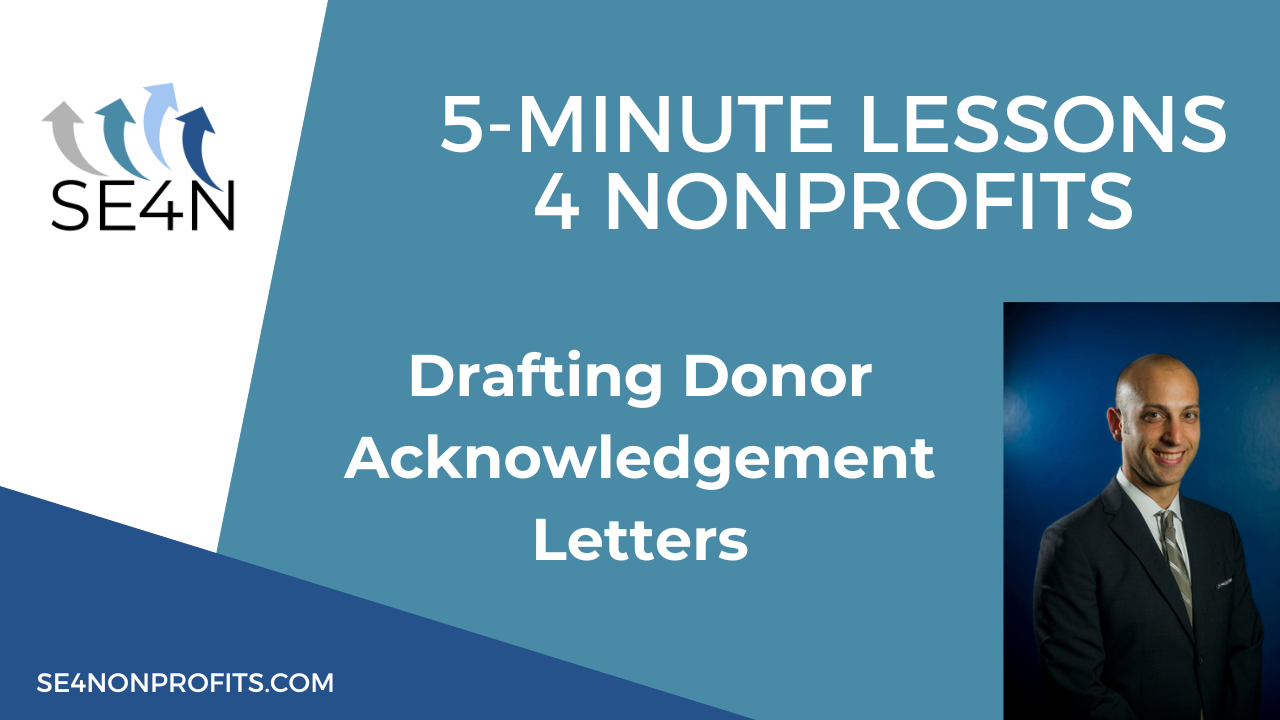
Blog.
Most Recent Posts
![TEMPLATE: Donor Acknowledgement Letters for Newly Formed Organizations [SUBSCRIBERS-ONLY]](https://images.squarespace-cdn.com/content/v1/5e6ccadfb4659c1d51df14d5/e0214792-50d4-4a57-8986-c23010a18b6c/mediamodifier-R35zUpA9Mbw-unsplash.jpg)
TEMPLATE: Donor Acknowledgement Letters for Newly Formed Organizations [SUBSCRIBERS-ONLY]
These donor acknowledgment letter templates are intended for newly formed organizations that receive donations prior to getting approval of 501(c)(3) status, including an initial acknowledgment with an explanation of the organization’s pending status, and follow-up letters updating the donor once the organization’s tax-exempt status is official. The included sample language is intended to generally satisfy basic IRS requirements for the most common donation scenarios, including cash contributions, non-cash contributions, as well as cash and non-cash gifts that are treated as quid pro quo contributions.

Q&A #162 – Can nonprofit volunteers deduct the value of their services as a charitable contribution?
The value of a volunteer’s time for in-kind services donated to a nonprofit organization is not tax deductible, and an organization should never state the dollar value of a volunteer’s services in an acknowledgment letter. However, it may be appropriate to provide volunteers with an acknowledgment letter that generally describes the services they provided so that volunteers can deduct certain eligible unreimbursed expenses.

TEMPLATE: Donor Acknowledgement Letters
These donor acknowledgment letter templates provides sample language that generally satisfies basic IRS requirements for the most common donation scenarios, including cash contributions, non-cash contributions, as well as cash and non-cash gifts that are treated as quid pro quo contributions.

VIDEO: What is a Quid Pro Quo Contribution? | Nonprofit Glossary
SE4N's Benjamin Takis provides a short summary of the term "quid pro quo contribution," how it affects a donor's use of the charitable deduction, and what obligations to apply to nonprofit organizations that receive donations that are partly in exchange for goods or services.

VIDEO: Drafting Donor Acknowledgment Letters | 5-Minute Lessons 4 Nonprofits
SE4N's Benjamin Takis provides a short lesson on what to include in donor acknowledgment letters, what NOT to include, how to handle quid pro quo contributions, and more.

Q&A #144 – What is the year-end charitable deduction deadline for donations made via credit card?
According to Internal Revenue Service guidance, donations made via credit card are eligible for the charitable deduction in the year in which the charge is made on the donor’s credit card, regardless of when the donor pays the credit bill or when the nonprofit ultimately receives the funds. See IRS Revenue Ruling 78-38 and Publication 526.

Successful Charity Auctions Start with Careful Planning
Charity auctions are used by nonprofit organizations of all shapes and sizes. Organizations that are thoughtful with their investment in time and planning can realize major benefits from their charity auctions. However, many nonprofits commit to holding charity auctions without committing to the time, planning, and due diligence necessary to realize the most successful event possible. A poorly planned charity auction can potentially impact net proceeds received, damage the organization’s reputation, and even expose the organization to tax liabilities and other possible risks.
![CHECKLIST: Charity Auctions Done Right [SUBSCRIBERS-ONLY]](https://images.squarespace-cdn.com/content/v1/5e6ccadfb4659c1d51df14d5/16fe2e55-4530-46ff-b4ee-f2d8c1c88760/Canva+auction+photo.png)
CHECKLIST: Charity Auctions Done Right [SUBSCRIBERS-ONLY]
R. Michael Sorrells (CPA) and A. Michael Gellman (CPA, CGMA) jointly authored this checklist of key “Dos” and “Don’ts” to help your nonprofit optimize its charity auctions, run them efficiently and without unwanted hiccups, and be prepared to comply with key tax and legal requirements.

Q&A #66 – Must a charity’s donation acknowledgement letter reflect the value of a celebrity’s presence?
The Treasury Regulations related to “quid pro quo” contributions (summarized in IRS Publication 1771) generally require that charities include in the acknowledgment letter a good faith estimate of the fair market value of goods or services provided to a donor in exchange for the donation, and only the portion of the donation that exceeds this fair market value is eligible for the charitable deduction. However, these regulations provide that a celebrity’s presence generally does not need to be taken into account when determining fair market value.

Q&A #45 – What donor incentives were included in the COVID-19 relief legislation that was enacted in December 2020?
You are referring to the Consolidated Appropriations Act of 2021 (P.L. 116-260), which was signed into law on December 27, 2020. In addition to many other provisions (the law is over 5,000 pages long), there are three main donor incentives: (1) the reestablishment (and slight modification) of the $300 “above the line” charitable deduction; (2) the extension of increased limits on deductible contributions for corporations and individuals who itemize; and (3) a special increased deduction limit for certain disaster relief contributions made by corporations.

Q&A #41 – How should new nonprofits acknowledge donations received prior to approval of 501(c)(3) status?
This question is one that is shared by virtually all new nonprofits that are seeking 501(c)(3) status. You are correct that an acknowledgment letter will be required in order for your donors to use the charitable deduction for their donations (assuming the donations exceed $250). And yes, donations made prior to the organization receiving 501(c)(3) status should retroactively qualify for the charitable deduction if and when 501(c)(3) status is approved (assuming the Form 1023 was correctly prepared and timely submitted). Your main question regarding how to handle the donation acknowledgment letter requires a bit more explanation.

Q&A #40 – How should nonprofits acknowledge donation checks received after December 31?
The short answer is that donors are permitted to treat a charitable contribution as made on the date it is placed in the mail via U.S. Postal Service, even if the check is not delivered or cashed until the following year, see Treas. Reg. § 1.170A-1(b). While it is not the charity’s responsibility to establish the date of delivery in the acknowledgement letter, you want to be as helpful as you can be to your donors. This can lead to some tricky situations.

Q&A #2 – Can donors use the charitable deduction for pre-paid fees for events that have been cancelled if the donor lets the organization keep the fees in lieu of a refund?
The IRS has never, to my knowledge, issued guidance on this particular question. But applying fundamental principles of the charitable deduction rules, people who affirmatively decline to receive a refund for cancelled events, and instead let the organization keep the remaining fees, should be able to deduct this portion as a “donation.”